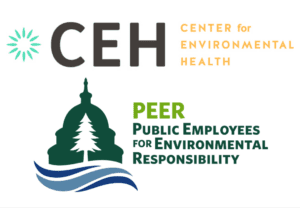FOR IMMEDIATE RELEASE
Thursday, July 25, 2024
CONTACT
Kyla Bennett [PEER] kbennett@peer.org, (508) 230-9933
Robert Sussman [CEH] bobsussman1@comcast.net, (202) 716-0118
New Suit Targets EPA Inaction on PFOA in Plastic Containers
EPA Sued for Failure to Implement TSCA Directive to Prevent Significant and Serious or Widespread Risks to Health
Washington, DC — The U.S. Environmental Protection Agency (EPA) must take prompt action under section 4(f) of the Toxic Substances Control Act (TSCA) to halt the manufacture and distribution of tens of millions of plastic containers with dangerous levels of PFOA, a uniquely harmful per-and polyfluoroalkyl substance (PFAS) that major manufacturers withdrew from production over a decade ago, according to a lawsuit filed today by Public Employees for Environmental Responsibility (PEER) and the Center for Environmental Health (CEH).
PFOA is a human carcinogen which, earlier this year, EPA determined has no safe level of exposure and may cause harmful effects in drinking water at any concentration above zero. PFOA and several other PFAS have been consistently detected in plastic containers fluorinated by Inhance Technologies, LLC. The fluorination process creates a chemical barrier on the plastic container to make it more durable, but it also imparts unsafe levels of PFOA to the container, which leach into the container contents. Inhance fluorinates an estimated 200 million containers a year. These containers are used to package a vast quantity of products, including chemicals, pesticides, personal care products, fuel tanks for lawnmowers and other consumer products, household cleaning agents, paint removers and floor waxes.
Under pressure from PEER and CEH, last December EPA found that PFAS-laden container linings fluorinated by Inhance posed an unreasonable risk to public health and the environment and ordered PFAS formation during fluorination promptly halted under section 5 of TSCA. However, the U.S. Court of Appeals for the 5th Circuit vacated EPA’s order, finding that EPA brought its action under the wrong section of TSCA. Thereafter, EPA declined to appeal that ruling and withdrew an enforcement action against Inhance. This month, EPA granted a petition filed by Earthjustice, CEH, PEER and other groups to initiate rulemaking to address three PFAS (PFOA, PFNA, and PFDA) created during the fluorination process. However, EPA announced no timeline for conducting this rulemaking or for implementing immediate safeguards to protect the public from being exposed to toxic PFAS in fluorinated plastic containers.
“EPA has still not committed to a specific plan of action or schedule for imposing prohibitions on this inherently hazardous industrial process,” stated Robert Sussman of CEH, a former senior EPA official. “EPA recognized the existence of an unreasonable, imminent hazard several months ago but has yet to deliver the necessary action to protect public health.”
Today’s lawsuit charges that EPA has shirked its legal obligation under Section 4(f) of TSCA, which requires the EPA Administrator to initiate action to protect the public within 180 days of receiving information that there is a reasonable basis to conclude that a chemical substance presents a significant risk of serious or widespread harm to humans. EPA has been concerned about PFOA for over 25 years and concluded early in 2023 that the best available science shows that there is no safe level of PFOA exposure. Starting in 2020, EPA has been investigating PFOA formation during fluorination and amassed voluminous data on the prevalence of PFOA from fluorinated containers in people, products and the environment. Today’s lawsuit charges that EPA has failed to act on the compelling evidence it has long possessed about this serious and widespread risk to human health.
“TSCA directs EPA to issue an immediately effective order ‘to prohibit or limit the manufacture, processing, or distribution in commerce’ of any industrial practice determined to present an unreasonable risk of serious or widespread injury before EPA can complete the normal rulemaking process,” stated PEER Science Policy Director Kyla Bennett, a scientist and attorney formerly with EPA. “EPA’s failure to protect the public from exposures to toxic PFOA in their daily lives is inexcusable and reflects a severe leadership deficit at the agency.”
###
See EPA accepting PFAS container petition
Look at EPA finding there is no safe level of PFOA for ingestion